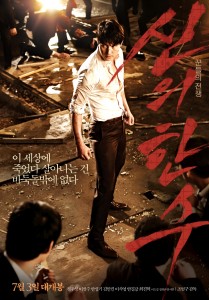
“The Divine Move” Korean Theatrical Poster
Director: Jo Beom-Goo
Writer: Yu Seong-Hyeop
Cast: Jeong Woo-Sung, Lee Bum-Soo, Ahn Seong-Gi, Kim In-Kwon, Lee Si-Young, Ahn Gil-Gang, Lee Do-Kyung, Choi Jin-Hyuk, Jeong Hae-Gyun, Ahn Seo-Hyun
Running Time: 118 min.
By Paul Bramhall
The gambling genre seems to come in and out of fashion in Asian cinema. The early 80’s gave us Shaw Brothers gambling flicks such as Challenge of the Gamesters, by the early 90’s we had Chow Yun Fat doing his thing in the God of Gamblers movies, and in recent years it seems the genre is back on the scene. Hong Kong gave us From Vegas to Macau and its sequel, and in 2014 Korea gave us The Divine Move.
Helmed by Jo Beom-goo, the director who gave us the Korean version of Speed on a motorbike with the 2011 action comedy Quick, The Divine Move revolves around the game of Go. Go involves placing black and white stones on a chequered playing board, the idea being for the players to outwit each other by surrounding the opposing players stones with their own. By the time the board is full, whoever has surrounded the most of the opposing players stones is the winner. Of course, there are countless nuances and intricacies outside of the above explanation, but that’s the basic concept.
The movies kicks off by introducing us to a pair of brothers, the younger of whom is played by Jeong Woo-seong, barely recognizable under a thick mop of hair and glasses, that are on their way to attend a game of Go. It quickly become clear that things are not quite right when the older brother explains he wants his younger sibling to stay back, guiding the game from their vehicle, thanks to a hidden camera and ear piece he’ll be wearing. Woo-seong reluctantly agrees, however when a storm knocks out the connection between them, the older brother is left to figure things out for himself against a superior opponent. Things go wrong, the price of losing is a slashed throat, and after Woo-seong attempts to save his brother, he’s ultimately caught by the police and jailed.
These events are what kick off The Divine Move, which declare what kind of movie it’s going to be from those very first minutes – Jailed younger brother is going to avenge his older brother’s death at the hands of Go playing gangsters. Just like director Beom-goo’s previous effort Quick, it’s an unashamedly straight forward plot device, only instead of being used for motorbike chases and explosions, here it’s used for tension filled games of Go and fist fights. Also like in Quick, the simplicity of the plot works as much in the movies favor as it does against it, but we’ll get into that more later.
The always reliable Woo-seong does a great job in his role. Most well known amongst action fans for his roles in movies like The Good, The Bad, The Weird, Cold Eyes, and Reign of Assassins, soon his character is playing Go with the chief of the prison, as well as being trained how to fight by a fellow inmate. This is the type of movie were you can have a one vs. many brawl in a prison yard in the middle of the night, and not a single guard will be around to see it. Scenes like this make The Divine Move play out more like an exaggerated comic rather than something that’s grounded in reality, and perhaps in recognition of this, the opening titles are also designed in a comic book style.
By the time Woo-seong is released from prison and ready to start bringing on the pain and, well, playing Go (not necessarily in that order), the movies biggest problem becomes apparent – we still don’t really know a single thing about him. Beom-goo seems to have been so pre-occupied with creating cool scenes of characters playing Go and beating each other up, that character development seems to have been left by the wayside. We know his brother was murdered, but why were they there in the first place, what’s their background? It’s something which is never explored, which makes everything feel very one dimensional, and dare I say flat.
The character development issue spills over into every other character in the movie – Woo-seong enlists the help of a down and out homeless Go master (who is also blind just for good measure) played by Ahn Seong-gi, but again we find out nothing about him and how he ended up the way he is, other than he had some past association with the same gangsters that murdered Woo-seong’s brother. The gangsters have a female master amongst them played by Lee Si-yeong, who looks like she doesn’t really enjoy working for them, and it’s mentioned in passing that she won a national Go competition when she was 20 then disappeared. Again, this is all we find out about her, even though she becomes a crucial character to the plot. Most glaringly of all though, is a Chinese child who the gangsters seem to be keeping captive due to her incredible Go playing ability, but who is given no back-story or explanation as to how she got there.
What this ultimately means for the viewer is that we’re left with a bunch of characters who we don’t really know anything about, so therefore have no connection with. What we do get though, is an abundance of scenes with characters playing Go, and then beating the living daylights out of each other, sometimes they play Go and beat each other up at the same time. One scene, which also seems to have come straight out of a comic book, has Woo-seong lock himself and one of gangsters in a freezer room, in which he’s set up a Go board in the middle of the floor and proceeds to turn the temperature down to -35. It’s all rather absurd that each of the gangsters he comes across seems happy to have a sit-down game of Go with him before getting down to the violence, but somehow The Divine Move exists in a world were playing Go seems to be the equivalent of boxers tapping their gloves together before a fight.
By the end of the movie the games of Go have also become one of its flaws, as there are simply too many of them. While Beom-goo does manage to infuse most of them with a sense of tension, there are a couple too many, which just end up feeling like a chore to watch. Thankfully the plot attempts to go out with a bang thanks to a bloody finish, in a year which seems to have brought back the brutal knife fight with a vengeance (see also No Tears for the Dead and Man on High Heels), Woo-seong and his blade also deliver an effectively wince worthy final showdown against those he’s seeking vengeance against.
All in all The Divine Move would perhaps be better titled Go and Violence, as that’s essentially what it amounts to. The 2006 Korean movie Tazza: The High Rollers took a similar concept, except instead of Go it was Flower Cards, and pulled it off with much more feeling, thanks to giving us characters that we cared about and a decent back-story. While Tazza had the likes of Kim Yoon-seok and Kim Hye-soo amongst its cast, actors like Woo-seong and Seong-gi are more than capable of giving equally charismatic performances, which leaves the finger pointed squarely at director Beom-goo. For his next movie, here’s hoping he keeps the fist fights, and exchanges the games of Go for some scenes were we can get to know the characters that we’re about to spend 2 hours with.
Paul Bramhall’s Rating: 6.5/10

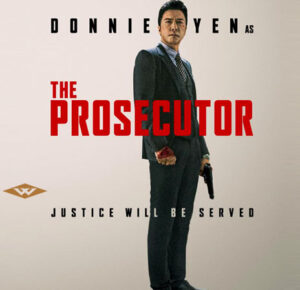
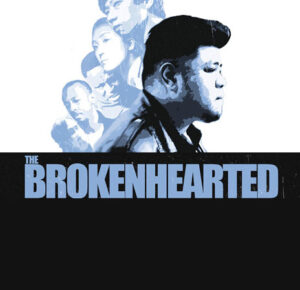
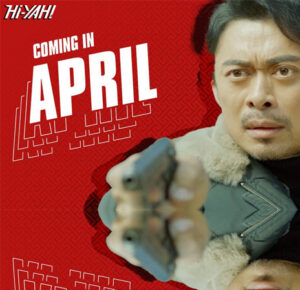
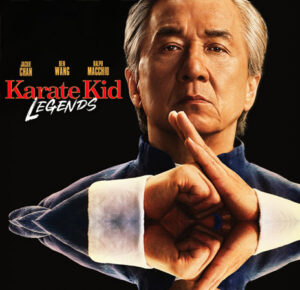






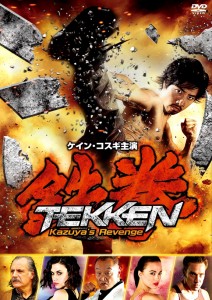











1 Comment